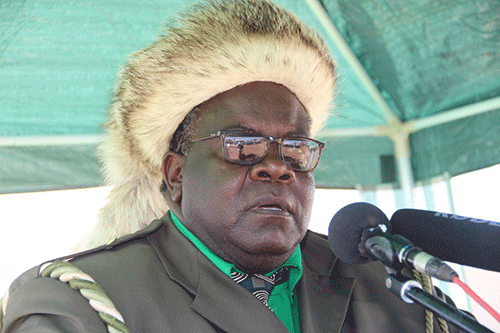Government claims the application which was filed by late Ovambanderu chief Kilus Nguvauva to contest its decision to recognise chief Turimuro Hoveka as a traditional leader, is based on falsehoods.
In September 2019, Nguvauva filed an application on behalf of the Ovambanderu Traditional Authority (OTA), seeking an order declaring the establishment of the Hoveka Traditional Authority, its chief and councillors as a direct result of government’s recognition of Hoveka as chief, null and void.
Nguvauva died on 1 July 2021.
OTA further seeks a declaration of the president’s decision to publish Hoveka’s designation as chief and his councillors in the Government Gazette, as null and void. In addition, the said Government Gazette no 6965 on 1 August 2019 as Proclamation 29 and Government Gazette notice 21 of 2020 in Government Gazette 7115 should be declared null and void.
It was Nguvauva’s argument that the Hoveka clan is one of the clans which make up the Ovambanderu, and the area alleged to be occupied by the Otjimana community which is represented by the Hoveka Royal House, falls within the jurisdiction of the Ovambanderu Traditional Authority.
Additionally, former urban and rural development minister Peya Mushelenga’s decision could encourage more clans within the Ovambanderu to break away and establish separate traditional authorities.
However, yesterday, lawyer Dennis Khama, who is representing the urban and rural development minister, the president, the Council of Traditional Leaders and the Omaheke governor, submitted that the claims upon which the application is based, are incorrect.
He said the assertion that the Hoveka Traditional Authority was not yet established at the time when the application was instituted, is untrue.
“…the sixth respondent was established by members of the Otjimana Traditional Community in 2018. This fact is supported by the record,” said Khama.
He also argued that the claim that in order to establish a traditional community, a chief or head of a traditional community must first be designated and recognised, is factually incorrect as the Act does not prescribe that a traditional community must be established, and how it ought to be established.
Khama said OTA is wrong to suggest that a traditional authority cannot be established until such a time that a chief has been designated and recognised.
Furthermore, the notion that an individual cannot belong to multiple traditional authorities, is likewise wrong.
Khama said there is no need to review and set aside the minister’s decision, as it was in accordance with the Act, and the right to designate a chief is in the hands of that particular traditional community, and not government.
“The designation cannot be declared null and void if the decision of the community is not being challenged… the court cannot grant the relief without hearing those people who made the decision to designate,” the lawyer continued.
In court documents, Hoveka, who is also opposing the application, said there is no dispute that the Hoveka Royal House comprises Ovambanderu, and the Otjama subjects are scattered all over Namibia. However, the Ovambanderu clans have never been under a centralised leadership.
Hoveka indicated that Nguvauva’s application is an attempt to achieve central power over communities which do not resort under him.
Natasha Bassingthwaighte, who argued on behalf of the OTA, said the Hoveka clan has been seeking recognition since 1999. In that first application, the traditional authority was identified as the Hoveka Royal House and the community was the Epukiro Traditional Community, which comprised 3 000 members.
The second application was done in 2008, followed by another application in 2012, and subsequently in 2018. All these applications were unsuccessful.
She said the facts presented in all those applications were not consistent with the successful application.
Bassingthwaighte submitted that historically, there were only three broad divisions within the Otjiherero-speaking community, being Ovaherero, Ovambanderu and Ovahimba.
“There is no mention of the Hoveka Royal House in the history books as a separate or distinct clan or grouping as there is the Zeraeua, Ovaherero, Kambezembi and Ovambanderu. The Hovekas were always mentioned as a clan that forms part of the Ovambanderu,” she stated.
She added that the minister’s decision needs reviewing, as he was aware that the areas in which the Hovekas seek recognition fall under the jurisdiction of the OTA. Furthermore, he assisted them with their application, which is inappropriate.
The hearing is ongoing before High Court Judge Thomas Masuku.
-mamakali@nepc.com.na


